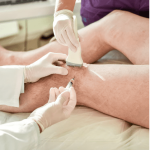In the pursuit of effective treatments for knee-related joint and tendon disorders, hyaluronic acid (HA) joint injections have emerged as a promising option. This comprehensive guide aims to unravel the applications, benefits, potential risks, and the crucial role that HA plays in enhancing joint health and function, with a special focus on the knees.
An Introduction to Hyaluronic Acid
Hyaluronic acid, a naturally occurring substance in our bodies, takes center stage in maintaining joint health, especially in the knees. This remarkable compound acts as a lubricant within the synovial fluid, ensuring frictionless movement between bones and cartilage, ultimately contributing to smooth and pain-free joint mobility. However, factors such as age and conditions like osteoarthritis can lead to a decline in HA levels, resulting in joint discomfort and reduced mobility.
The Multifaceted Uses of Hyaluronic Acid for Knees
HA injections have gained popularity as a treatment for knee-related issues, particularly in cases of knee osteoarthritis. The benefits of using hyaluronic acid for knees are diverse and impactful:
Joint Lubrication:
HA functions as a natural lubricant, reducing friction within the knee joint’s moving components and mitigating wear and tear.
Pain Alleviation:
Meticulously designed HA injections act as a cushion, providing respite to individuals battling knee osteoarthritis by lessening the impact on joints and offering relief from discomfort.
Enhanced Mobility:
By elevating joint lubrication and reducing pain, HA contributes to improved knee mobility and flexibility, particularly beneficial for those dealing with stiffness or a restricted range of motion.
The Procedure: Hyaluronic Acid Injections for Knee Pain

For individuals grappling with knee osteoarthritis or other knee-related concerns, HA injections present a glimmer of hope. Administered by healthcare professionals, the procedure involves the direct injection of HA into the knee joint.
The Injection Process:
- Preparation: The patient’s knee area is meticulously cleaned and sterilized to minimize the risk of infection.
- Injection: A fine needle is employed to inject hyaluronic acid directly into the knee joint. This procedure is typically swift and relatively painless.
- Recovery: Following the injection, patients may experience mild discomfort or swelling, which generally subsides within a few days.
Benefits:
The positive effects of hyaluronic acid injections typically become discernible within a few weeks. Patients often report diminished knee pain, improved mobility, and enhanced knee function.
Are You a Candidate for Hyaluronic Acid Injections?
Hyaluronic acid injections are primarily recommended for individuals dealing with knee osteoarthritis who have not found relief through other treatment options. However, the suitability of this treatment should be discussed with a healthcare provider, as it may not be appropriate for everyone.
Potential Risks and Complications
While hyaluronic acid injections for knees are generally safe, it’s imperative to be aware of potential risks and complications. These may include:
- Nerve Injury and Worsening of Symptoms: In exceedingly rare cases, patients may experience a transient increase in symptoms. Nonetheless, the risk remains less than 0.1%.
- Infection: As with any medical intervention, there is a minimal risk of infection. Septic arthritis, although exceptionally rare, should be monitored for and addressed promptly if suspected.
- Joint Swelling: Temporary swelling may occur but is typically transient.
- Treatment Failure: While hyaluronic acid injections often yield positive results, there is no guarantee that pain will be completely eradicated or won’t resurface.
- Risk of Bleeding: Particularly relevant for individuals on anticoagulants, the risk of bleeding from the injection site should be considered. It is essential to ensure proper blood clotting before the injection.
- Other Potential Complications: These may encompass temporary symptoms such as feeling flushed or faint, allergic reactions, menstrual irregularity, vascular damage, and a small risk of temporary immunosuppression.
In Summary
Hyaluronic acid for knees offers a natural and effective solution for individuals seeking relief from knee pain and improved joint function. This remarkable substance, administered through injections, has the potential to transform the lives of those grappling with knee-related issues, providing a path to greater comfort and mobility. However, it’s crucial to consult with a healthcare provider to determine if hyaluronic acid injections are the right choice for you and to be aware of the potential risks associated with the procedure.
Conclusion
As you contemplate the potential benefits and risks of hyaluronic acid for knees, remember that a thorough discussion with a medical professional is crucial to make an informed decision about your knee health and well-being. With the right guidance and personalized care, you can embark on a journey towards healthier and pain-free knees, ultimately enhancing your overall quality of life.













